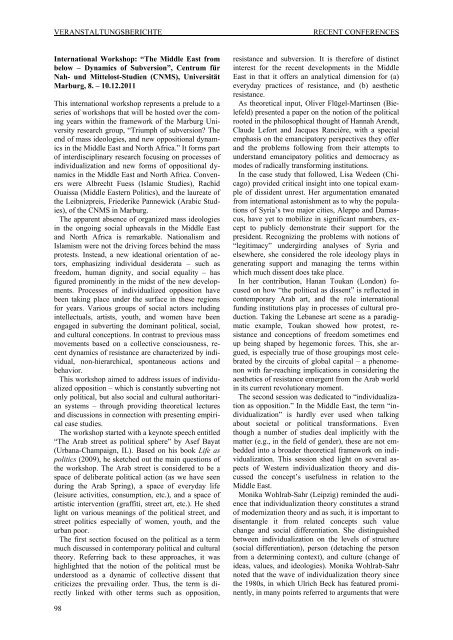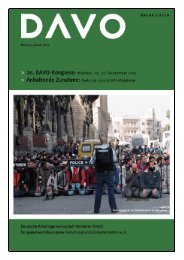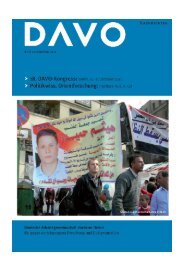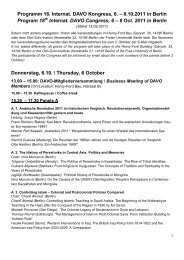4 Dissertationen und Habilita- tionen / Dissertations and Habilitations
4 Dissertationen und Habilita- tionen / Dissertations and Habilitations
4 Dissertationen und Habilita- tionen / Dissertations and Habilitations
Erfolgreiche ePaper selbst erstellen
Machen Sie aus Ihren PDF Publikationen ein blätterbares Flipbook mit unserer einzigartigen Google optimierten e-Paper Software.
VERANSTALTUNGSBERICHTE RECENT CONFERENCES<br />
International Workshop: “The Middle East from<br />
below – Dynamics of Subversion”, Centrum für<br />
Nah- <strong>und</strong> Mittelost-Studien (CNMS), Universität<br />
Marburg, 8. – 10.12.2011<br />
This international workshop represents a prelude to a<br />
series of workshops that will be hosted over the coming<br />
years within the framework of the Marburg University<br />
research group, “Triumph of subversion? The<br />
end of mass ideologies, <strong>and</strong> new oppositional dynamics<br />
in the Middle East <strong>and</strong> North Africa.” It forms part<br />
of interdisciplinary research focusing on processes of<br />
individualization <strong>and</strong> new forms of oppositional dynamics<br />
in the Middle East <strong>and</strong> North Africa. Conveners<br />
were Albrecht Fuess (Islamic Studies), Rachid<br />
Ouaissa (Middle Eastern Politics), <strong>and</strong> the laureate of<br />
the Leibnizpreis, Friederike Pannewick (Arabic Studies),<br />
of the CNMS in Marburg.<br />
The apparent absence of organized mass ideologies<br />
in the ongoing social upheavals in the Middle East<br />
<strong>and</strong> North Africa is remarkable. Nationalism <strong>and</strong><br />
Islamism were not the driving forces behind the mass<br />
protests. Instead, a new ideational orientation of actors,<br />
emphasizing individual desiderata – such as<br />
freedom, human dignity, <strong>and</strong> social equality – has<br />
figured prominently in the midst of the new developments.<br />
Processes of individualized opposition have<br />
been taking place <strong>und</strong>er the surface in these regions<br />
for years. Various groups of social actors including<br />
intellectuals, artists, youth, <strong>and</strong> women have been<br />
engaged in subverting the dominant political, social,<br />
<strong>and</strong> cultural conceptions. In contrast to previous mass<br />
movements based on a collective consciousness, recent<br />
dynamics of resistance are characterized by individual,<br />
non-hierarchical, spontaneous actions <strong>and</strong><br />
behavior.<br />
This workshop aimed to address issues of individualized<br />
opposition – which is constantly subverting not<br />
only political, but also social <strong>and</strong> cultural authoritarian<br />
systems – through providing theoretical lectures<br />
<strong>and</strong> discussions in connection with presenting empirical<br />
case studies.<br />
The workshop started with a keynote speech entitled<br />
“The Arab street as political sphere” by Asef Bayat<br />
(Urbana-Champaign, IL). Based on his book Life as<br />
politics (2009), he sketched out the main questions of<br />
the workshop. The Arab street is considered to be a<br />
space of deliberate political action (as we have seen<br />
during the Arab Spring), a space of everyday life<br />
(leisure activities, consumption, etc.), <strong>and</strong> a space of<br />
artistic intervention (graffiti, street art, etc.). He shed<br />
light on various meanings of the political street, <strong>and</strong><br />
street politics especially of women, youth, <strong>and</strong> the<br />
urban poor.<br />
The first section focused on the political as a term<br />
much discussed in contemporary political <strong>and</strong> cultural<br />
theory. Referring back to these approaches, it was<br />
highlighted that the notion of the political must be<br />
<strong>und</strong>erstood as a dynamic of collective dissent that<br />
criticizes the prevailing order. Thus, the term is directly<br />
linked with other terms such as opposition,<br />
98<br />
resistance <strong>and</strong> subversion. It is therefore of distinct<br />
interest for the recent developments in the Middle<br />
East in that it offers an analytical dimension for (a)<br />
everyday practices of resistance, <strong>and</strong> (b) aesthetic<br />
resistance.<br />
As theoretical input, Oliver Flügel-Martinsen (Bielefeld)<br />
presented a paper on the notion of the political<br />
rooted in the philosophical thought of Hannah Arendt,<br />
Claude Lefort <strong>and</strong> Jacques Rancière, with a special<br />
emphasis on the emancipatory perspectives they offer<br />
<strong>and</strong> the problems following from their attempts to<br />
<strong>und</strong>erst<strong>and</strong> emancipatory politics <strong>and</strong> democracy as<br />
modes of radically transforming institutions.<br />
In the case study that followed, Lisa Wedeen (Chicago)<br />
provided critical insight into one topical example<br />
of dissident unrest. Her argumentation emanated<br />
from international astonishment as to why the populations<br />
of Syria’s two major cities, Aleppo <strong>and</strong> Damascus,<br />
have yet to mobilize in significant numbers, except<br />
to publicly demonstrate their support for the<br />
president. Recognizing the problems with notions of<br />
“legitimacy” <strong>und</strong>ergirding analyses of Syria <strong>and</strong><br />
elsewhere, she considered the role ideology plays in<br />
generating support <strong>and</strong> managing the terms within<br />
which much dissent does take place.<br />
In her contribution, Hanan Toukan (London) focused<br />
on how “the political as dissent” is reflected in<br />
contemporary Arab art, <strong>and</strong> the role international<br />
f<strong>und</strong>ing institutions play in processes of cultural production.<br />
Taking the Lebanese art scene as a paradigmatic<br />
example, Toukan showed how protest, resistance<br />
<strong>and</strong> conceptions of freedom sometimes end<br />
up being shaped by hegemonic forces. This, she argued,<br />
is especially true of those groupings most celebrated<br />
by the circuits of global capital – a phenomenon<br />
with far-reaching implications in considering the<br />
aesthetics of resistance emergent from the Arab world<br />
in its current revolutionary moment.<br />
The second session was dedicated to “individualization<br />
as opposition.” In the Middle East, the term “individualization”<br />
is hardly ever used when talking<br />
about societal or political transformations. Even<br />
though a number of studies deal implicitly with the<br />
matter (e.g., in the field of gender), these are not embedded<br />
into a broader theoretical framework on individualization.<br />
This session shed light on several aspects<br />
of Western individualization theory <strong>and</strong> discussed<br />
the concept’s usefulness in relation to the<br />
Middle East.<br />
Monika Wohlrab-Sahr (Leipzig) reminded the audience<br />
that individualization theory constitutes a str<strong>and</strong><br />
of modernization theory <strong>and</strong> as such, it is important to<br />
disentangle it from related concepts such value<br />
change <strong>and</strong> social differentiation. She distinguished<br />
between individualization on the levels of structure<br />
(social differentiation), person (detaching the person<br />
from a determining context), <strong>and</strong> culture (change of<br />
ideas, values, <strong>and</strong> ideologies). Monika Wohlrab-Sahr<br />
noted that the wave of individualization theory since<br />
the 1980s, in which Ulrich Beck has featured prominently,<br />
in many points referred to arguments that were





